John Batt
Recollections, 1954
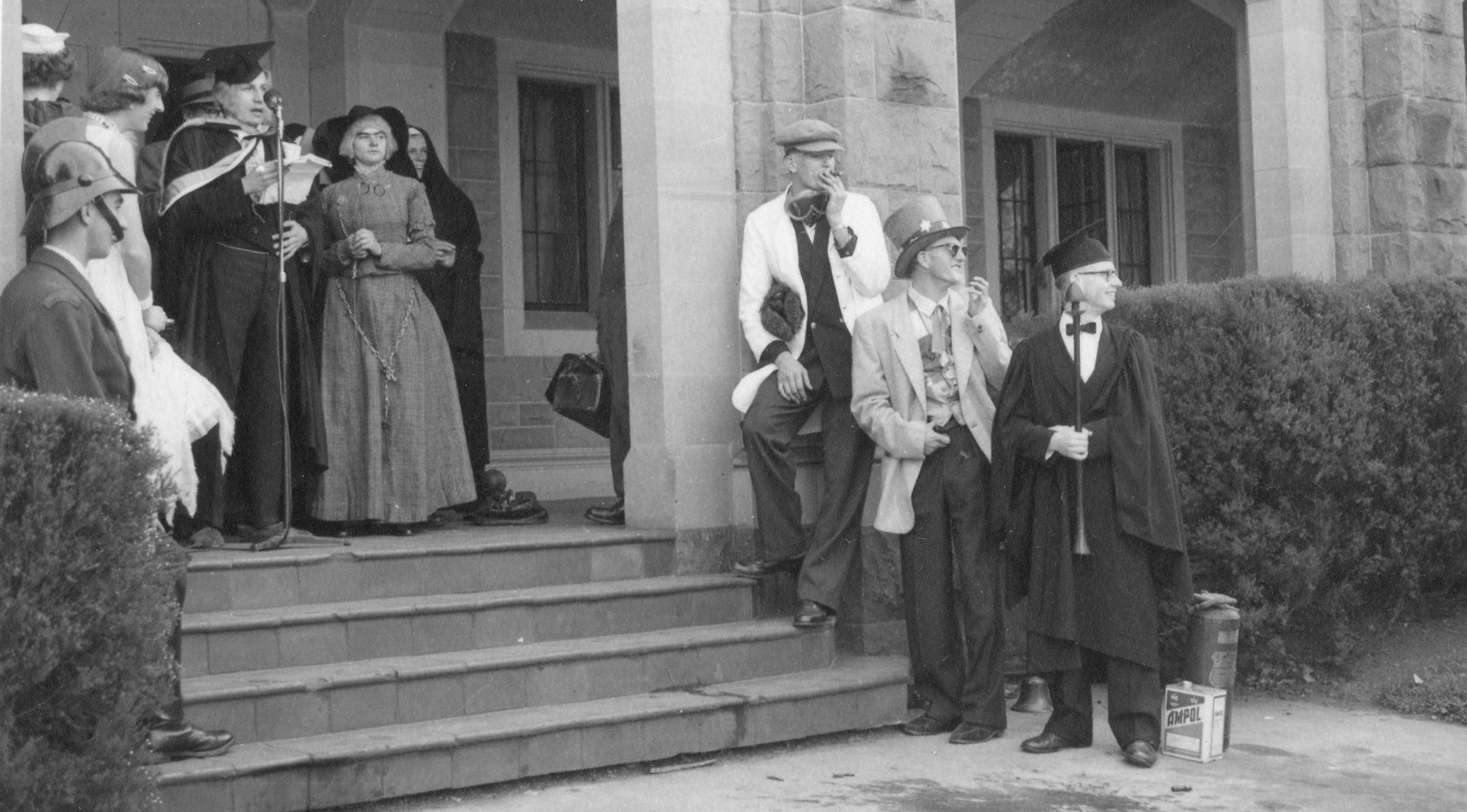
There were of course no resident women students. Indeed women visitors were not permitted after 6pm on most days ...
John Batt came in to Trinity in 1954 on the Charles Hebden Scholarship, studying Arts and Law at the University of Melbourne. He was a distinguished classics scholar with a natural talent for languages, receiving First Class Honours in both Greek and Latin in his second year. He was admitted to the Bar in 1961 and became Queen's Counsel in Victoria in 1977, before subsequently being appointed Queen's Counsel in New South Wales, Tasmania, the ACT, Western Australia and South Australia. Batt joined the bench of the Supreme Court of Victoria in 1994 and served on a number of the court's committees before retiring in 2005. Since then, he has continued his work as a prominent layperson in the Anglican Diocese, including as Chancellor of the Diocese of Wangaratta.
In 1956, in his final year at Trinity, he became the inaugural holder of the role known today as the College Jester, but then referred to as the 'Keeper of the Kollege Konstitution'.
Trinity in the middle fifties was much less populous and more compact than it is today. Jeopardy and Cowan buildings did not exist, but the notorious Wooden Wing, erected temporarily in 1919 on terms that it should remain for two years only, still stood beside the JCH tennis court. In Bishops' and Clarke's the rooms facing the oak served as a study for two men (described, without the slightest innuendo then, as "college wives") and, as the basins in them still indicate, the smaller rooms across the corridor served as single bedrooms.
At the time it was thought – wrongly, it would now seem – that the number of students then in residence (some 120) could not be increased without changing the character and destroying the essential unity of the College.
There were of course no resident women students. Indeed women visitors were not permitted after 6pm on most days and I recall in my first year the chilling effect of the news that the Warden had fined a final-year student what was then a substantial sum (5 pound, I think) for having his fiancee in his room until 6.05pm.
Cows still grazed in the Bulpadock, the nearest herd to the GPO thus it was that Anthony Clunies-Ross, in a brilliant speech as senior freshman in 1955, had occasion to speak of "the juxtaposition of the bovine and the ecclesiastical".
The average age and length of residence of students were, I believe, greater than they are today. In 1954 the senior resident student was in his eighth year - completing medicine after having graduated in arts and science! One soon learned the seniority of others, for a set table seating for dinner in Hall was arranged for each term on the principle juniores posteriores.
One other custom showed freshers their place: they were rostered to answer the phones (then located near the JCR) and stoke the boilers in the Behan basement. Woe betide a fresher if a final-year student in Upper Behan did not have hot water for his shower the next day. Upper Behan was also a long way from the phones.
There were no "O Week" festivities. Rather, one came into College on the Sunday immediately before the commencement of first term. This always seemed to fall on St Patrick's Day and, if coming from south of the Yarra, one had to make a detour around the city to avoid the crowds that the march led, or reviewed, by Archbishop Mannix then attracted.
Activities similar to those of "O Week" nowadays, but I think more restrained than what occurred in "Swot Week", the last week of the second term vacation. It was at that stage of the year that the playing of bowls after lunch would start. Subsequent topographical and like changes appear to have reduced the number of arboreal obstacles for bowlers.
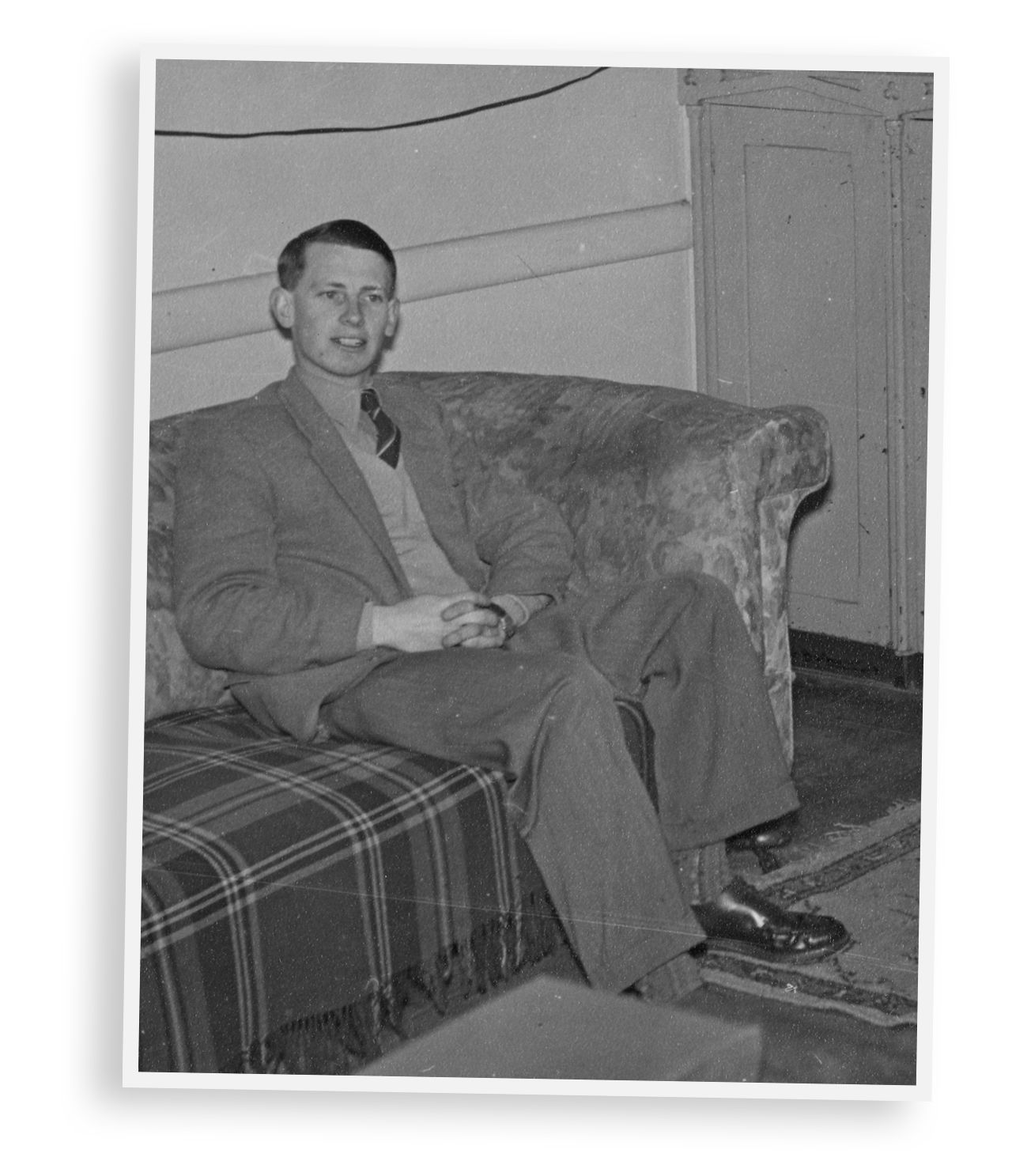
John 'Jack' Batt (TC 1954) in Upper Clarke IV, Trinity College, 1950s
John 'Jack' Batt (TC 1954) in Upper Clarke IV, Trinity College, 1950s
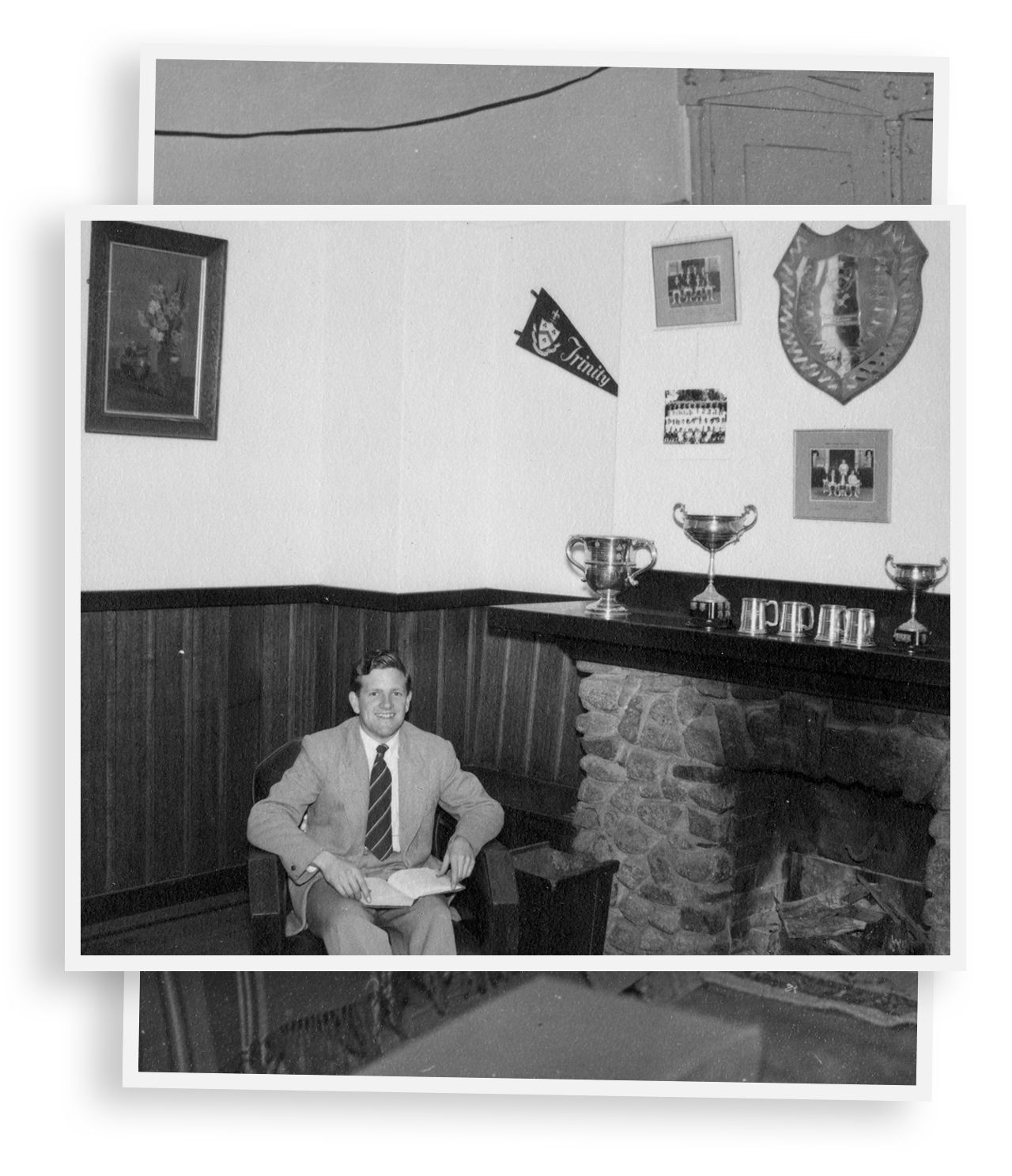
John Royle (TC 1954) with his trophy 'collection' in his room in Behan, Trinity College, 1950s
John Royle (TC 1954) with his trophy 'collection' in his room in Behan, Trinity College, 1950s
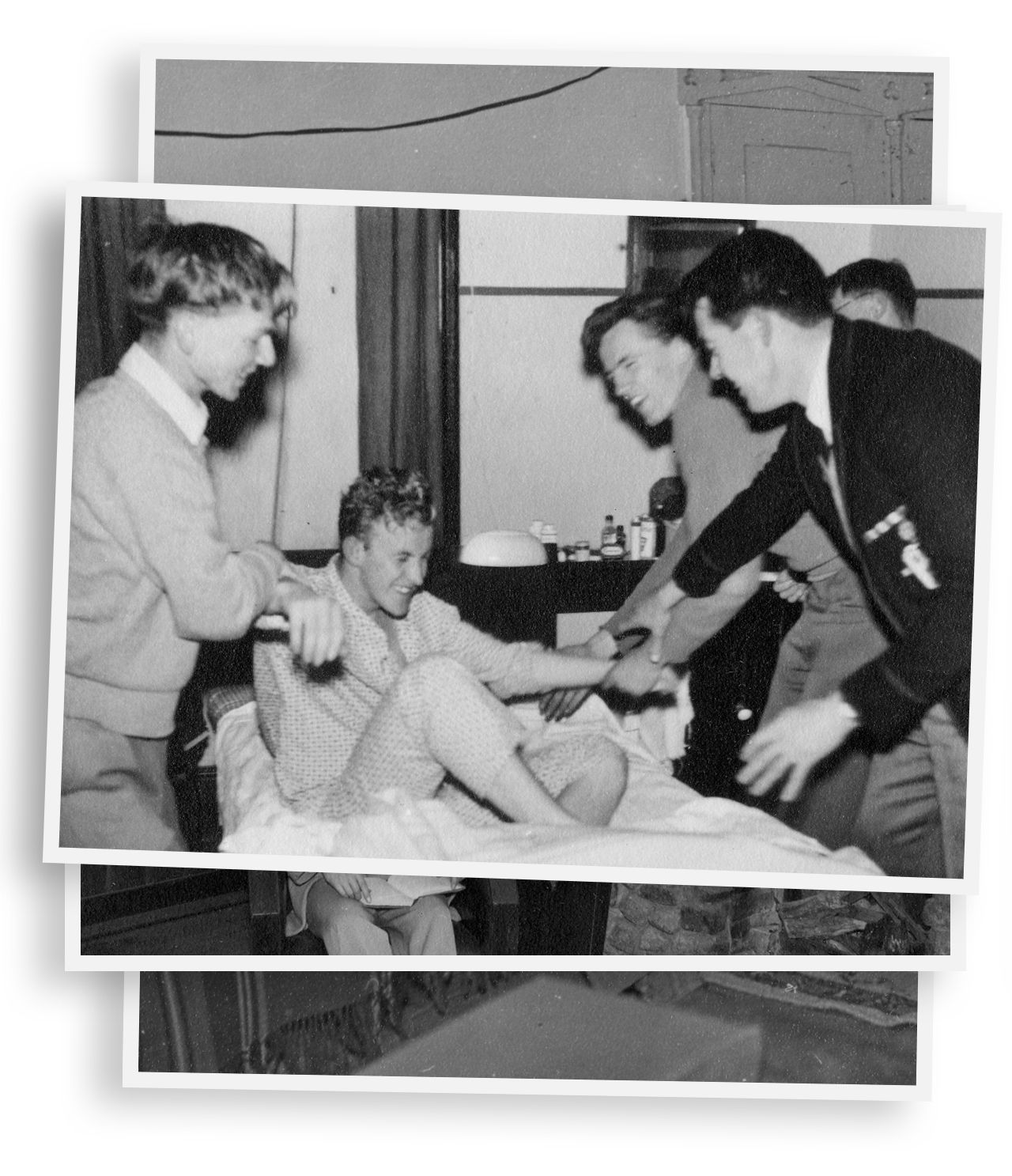
Peter Read (TC 1954) awakened on his 21st birthday (one minute past midnight!), 1957
Peter Read (TC 1954) awakened on his 21st birthday (one minute past midnight!), 1957
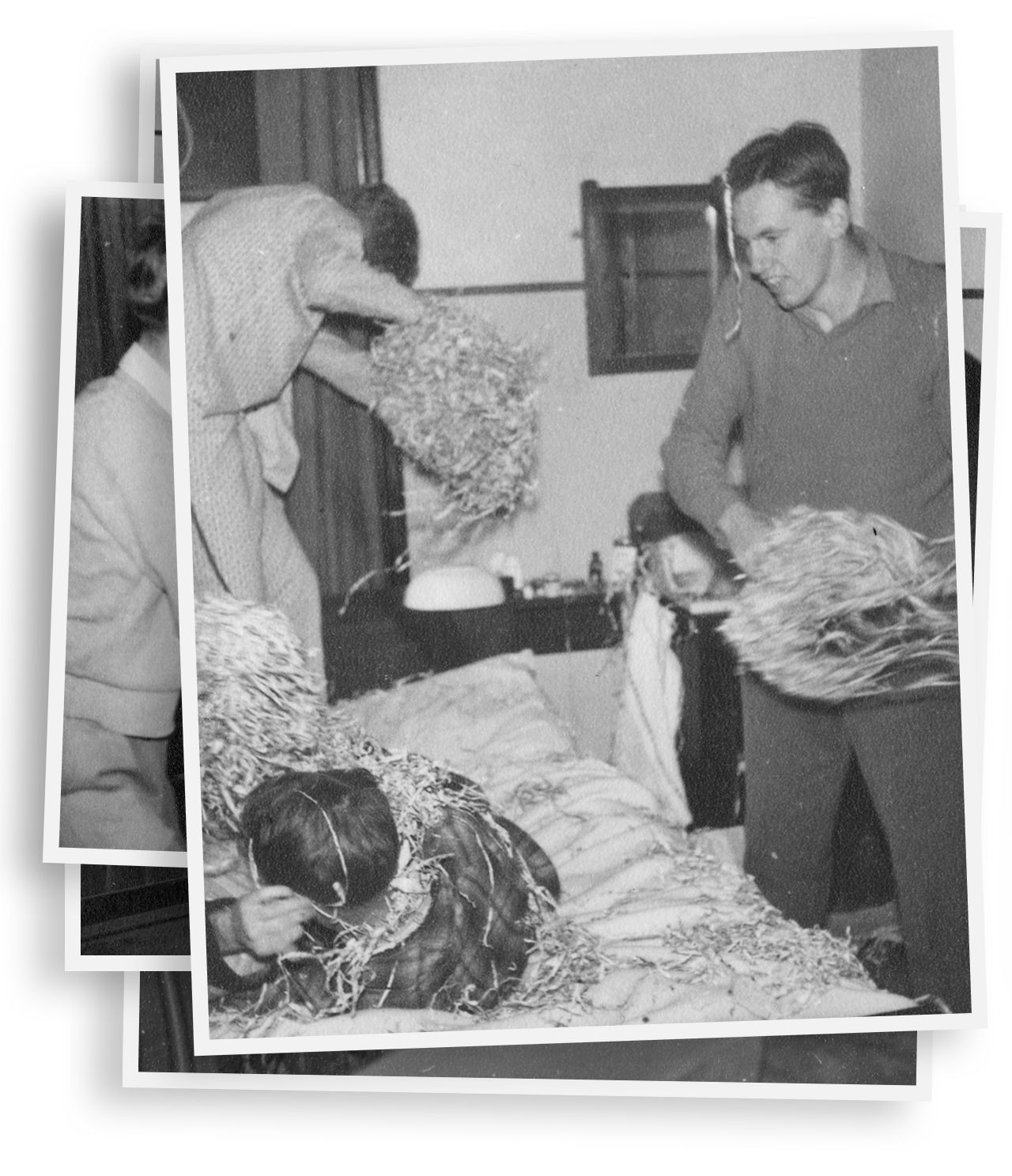
Peter Read (TC 1954) awakened on his 21st birthday (one minute past midnight!), 1957
Peter Read (TC 1954) awakened on his 21st birthday (one minute past midnight!), 1957
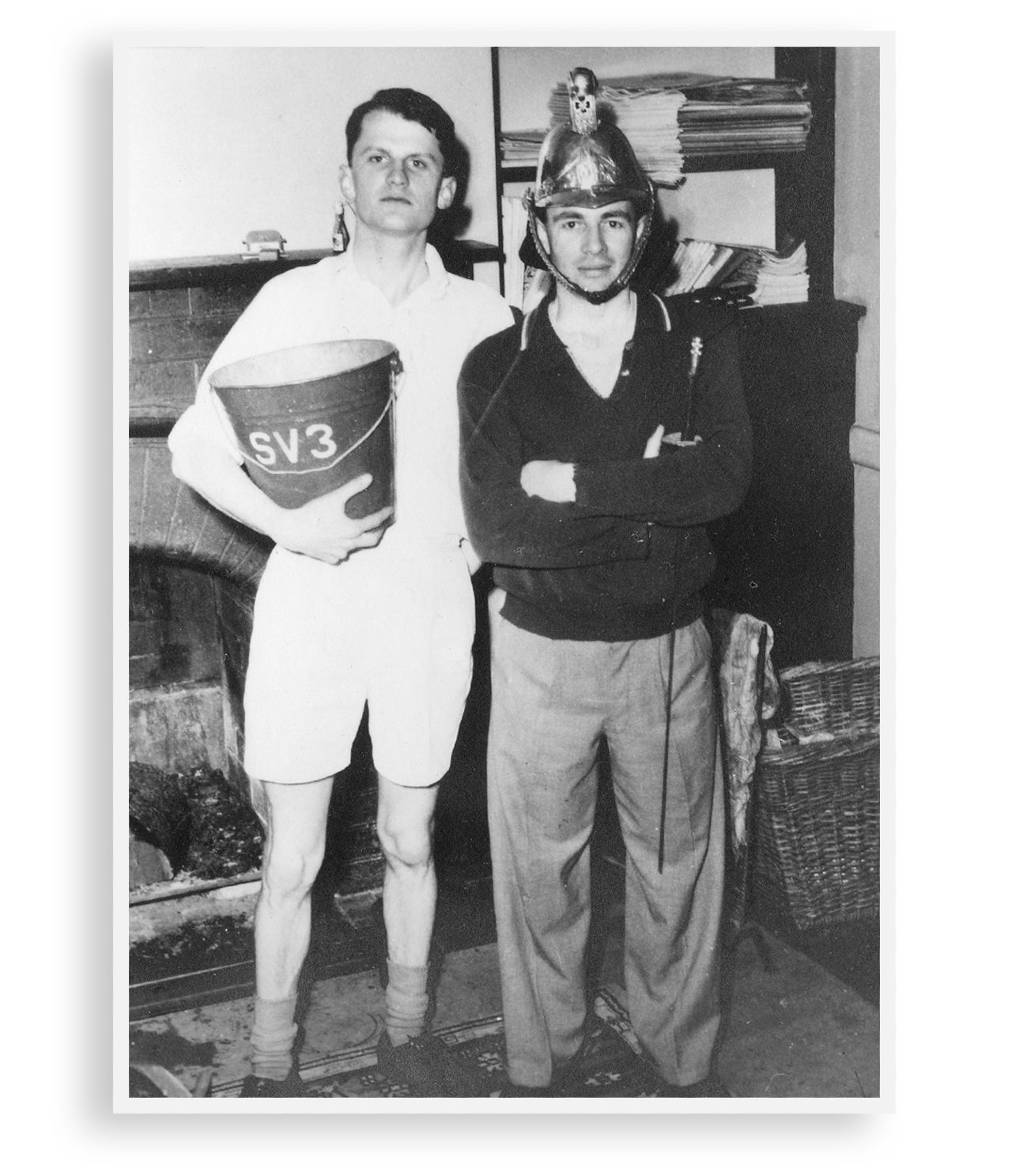
Student 'firemen' ensuring everything is in order in a student room in Behan Building, 1950s
Student 'firemen' ensuring everything is in order in a student room in Behan Building, 1950s
Whilst it is difficult to generalise or to be sure of the facts, I have the impression that students on the whole did more studying in the evenings during the week in first and second terms than their successors do now. There were fewer mid-week parties and many students, perhaps after purchasing some groceries from the store at the south end of Bishops', started work by 7.30pm.
It is true that almost everyone stopped work at 10pm for supper. This was a College institution. Often seniors would invite freshers. Frequently the conversation, whether arcane or mundane, esoteric or erotic, important or trivial, would extend beyond midnight and work would not be resumed that evening.
Only senior residents were allowed cars. Few had them and some at least of the cars were of doubtful reliability. The eating houses of Carlton were far less developed or attractive than now. Not many students had part-time employment. All these differences help to explain why (if it be the fact) more evening studying in first and second terms was done then.
But I do not mean to suggest that all was seriousness. There were squash parties, Wimbledon nights, and so on. In addition there were sherry parties before dinner. These have apparently fallen into desuetude, though I understand that only the beverage and the location have changed. Some sherry parties became very large (I have seen a study in Upper Clarke's packed to capacity) and success was measured by the number of flagons consumed. Such parties became known in the argot of the time as flagoon parties.
Wood fires were the rule, rather than the exception, for heating in winter. Peter Pockley managed to keep his burning continuously for 100 days.
Whether that record still stands I do not know. My own record was less – or perhaps more – glowing: Bernard Newsome, with whom I shared a study next to the store in Bishops', and I returned one evening to find that a log had rolled beyond the hearth and burnt through the floorboards. Fortunately, it was a ground floor study.
At the end of term the Warden would hold his own "sherry party". But an invitation to this was not sought after, for it was a somewhat incisive review of the performance of students whose tutors had reported adversely.
The late John O'Brien, a scholarly man who took Greek and Latin tutorials (in some of which he played "Under Milk Wood"), on one occasion reported that attendance by his students had been regular, but not frequent: we had taken it in turns to attend. The Warden was a man of considerable influence and references from him were sought after. But he was known to write, where he thought it appropriate, "Mr. X has completed the course to his own satisfaction".
The creation of the office of Keeper of the Kollege Konstitution occurred, so far as I can now recall, spontaneously and as a joke. At the TCAC meeting in 1956 Alan Cornell moved that I be appointed to the office and the motion was carried.
Unlike (I understand) more recent holders of the office, I had to undergo no test or trial. A wooden mace-like object, of a distinctive shape, was presented to me. No functions or duties were specified. At any rate, I performed none. I believe that I attended Juttoddie and the rowing in my official capacity. After a year a successor was appointed. With him and his successors the role of the KKK expanded.
Remembrances of John Batt (TC 1954), provided back to Trinity College in 1988.
In the early 2000s, in response to cultural shifts that arguably were well overdue, the former role of the Keeper of the Kollege Konstitution was reconfigured to the current, light-hearted comic position - the College Jester!
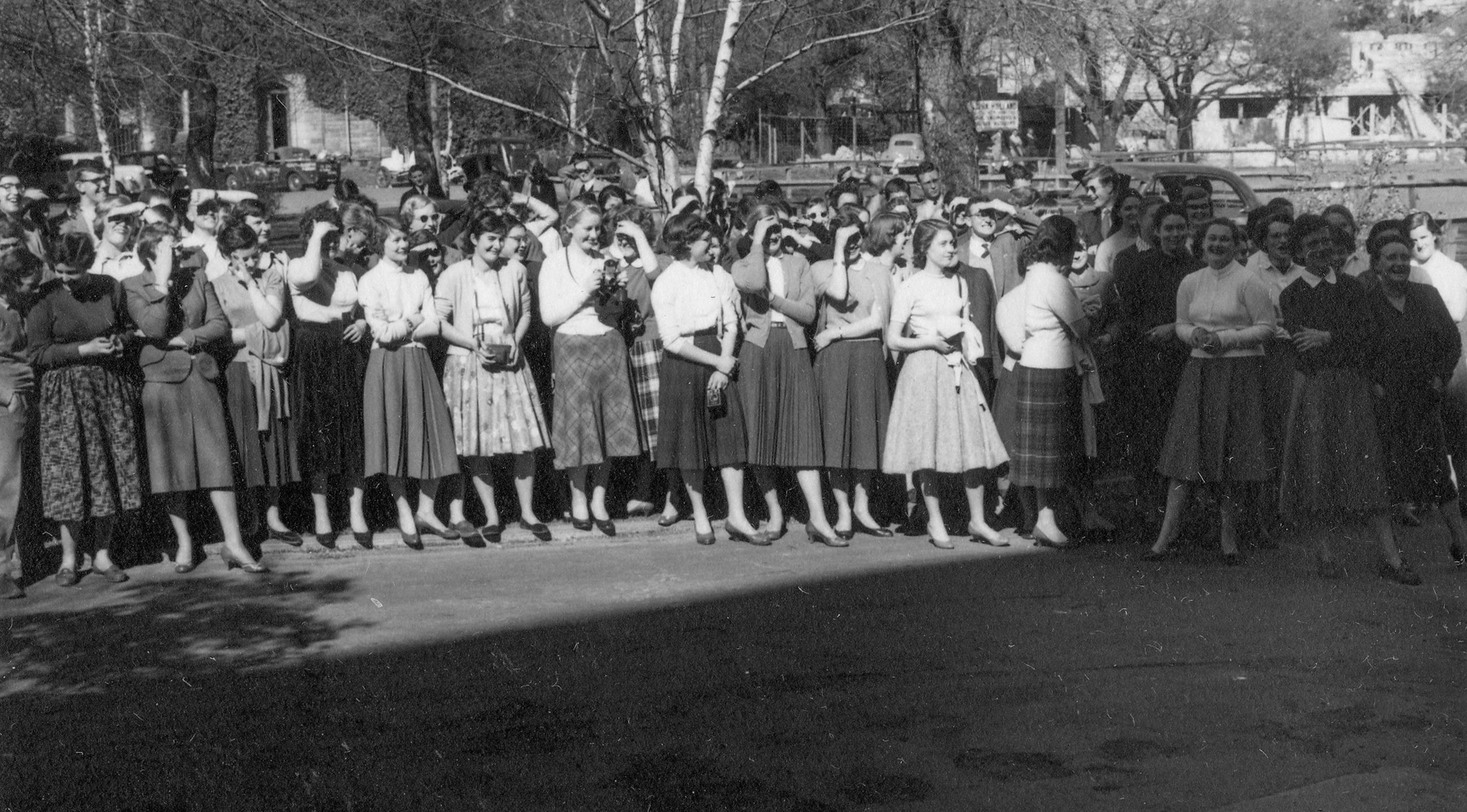

Dr Ben Thomas, Rusden Curator, Cultural Collections
Dr Ben Thomas, Rusden Curator, Cultural Collections





